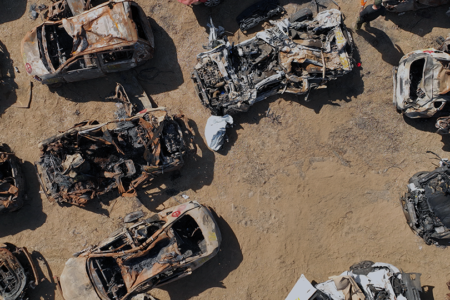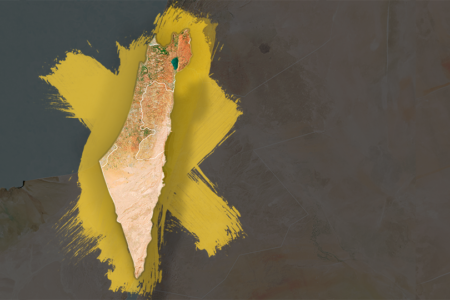The Mid-East And the Word of God
A sermon preached by the Rev. Philip Everett Worth at the First United Methodist Church in in Collingswood, New Jersey.
“Mid-East Crisis Deepens!” screamed the headlines of the news media. This captured the attention of the entire world when five skyjackings were attempted by Palestinian guerrillas. U.S. NEWS AND WORLD REPORT spoke of “. . . Palestinians who turned the Jordanian desert into a prison camp for hundreds of airline passengers.” The article concluded that “Palestinians had to demonstrate dramatically—yes, ruthlessly, their conviction that the only way for them to recover Palestine is by fighting, not negotiating.”
What is behind all of this? Why is there animosity which becomes a catalyst for acts like this? Why all the tension? Where did it begin? To answer this question we go back to the Bible. Fortunately, we have in God’s Word the most comprehensive book on the Mid-East crisis. It outlines for us the origin of the hatred, details the fulfilled prophecy concerning the nation Israel and also pulls back the curtain and gives us a look into the future of the nations in this important part of the world. Let us look into the Bible and see what it can tell us about the present dilemma.
The Roots of The Arab-Jewish Conflict
Turn to Genesis, Chapter 12: It is here that God made a covenant with Abram, or Abraham as we know him, promised him a land and informed him that he would be the progenitor of a great nation. Verse 10 tells us that because of a famine in that land, Abraham went down into Egypt. Here he acquired for his wife an Egyptian maid by the name of Hagar. Later he and his nephew, Lot, made their way back into the land which God had promised but found when they did that “they could not dwell together.” (13:6) “There was strife between the herdsmen of Abram’s cattle and the herdsmen of Lot’s cattle.” Abraham, in an attempt at peaceful negotiation, offered his nephew any portion of the land he desired. We read that Lot “looked . . . chose . . . dwelt . . . and finally . . . pitched his tent toward Sodom.” Chapter 13:13 tells us, “the men of Sodom were wicked and sinners before the Lord exceedingly.” The combination of Lot’s actions is a sure formula for destruction. The record tells us that Abraham had to deliver Lot from a tribal king.
The last mention we have of Lot projects the sordid picture of Lot living in a cave in the mountains of Zoar with his two daughters. It is here that they become guilty of incest.
It is interesting that his one daughter had a son whose name was Moab. He is the father of the Moabites, avowed enemies of God’s people. The other daughter’s child was named Ben-Ammi, and was the father of the children of Ammon. (Gen. 19:37, 38). Does this name sound familiar to you? Isn’t this the same as Amman, the town where the hi-jacked people were recently held hostage in the Jordanian desert? The hostility began in part with the strife between Abraham’s and Lot’s herdsmen. Later, Lot became the father of both the Moabites and the Ammonites, traditional enemies of Israel.
There is another classic example in the Bible. God promised Abraham not only a land but also a people. This man, favored by God, asked an unusual question (Gen. 15:2): “Lord, God, what wilt thou give me, seeing I go childless?”
God answered by saying (17:16) “I will give thee a son.” But to Abraham to Sarah it was a big joke. The record tells us that when they heard the news they laughed. Through lack of faith, Sarah gave her Egyptian maid, Hagar, to Abraham to bear his child, but when Hagar learned that she was to bear Abraham’s child she came to despise Sarah. This child was named Ishmael (6:11).
The Bible vividly describes him as a “wild man,” but from him (17:20) God promised to “make a great nation.”
Now if we study the Bible and supplement it with our contemporary news media, we have no question as to who the descendants of Ishmael are. They are the Arab nations. In fact, Gen. 25:18 reveals that the sons of Ishmael would inhabit Egypt.
The New Testament sheds some light on this in Galatians 4:22, where Paul calls to our remembrance that Abraham had not one but two sons. One was by a bondmaid and the other by a freewoman, namely his rightful wife, Sarah. Paul points out that the one who was “born after the flesh persecuted him that was born after the Spirit,” and Paul concludes, “Even so it is now.” Thus Abraham was the father of two nations; the one persecuting the other, and this animosity has continued until our day.
It is interesting to follow through the story of Ishmael. Usually we concentrate on Abraham, Isaac, Jacob, etc. But look at Abraham’s older son for a moment. Genesis 21:21 tells us that Ishmael’s mother took for him a bride out of her land, Egypt. He and his wife had 12 sons. Genesis, Chapter 25 names them for us. But Genesis 28:9 informs us that they also had a daughter. Did you know that she became the bride of Esau? It is through this union of Esau and Ishmael’s daughter that the Mid-East crisis continues.
Look at the conflict between Jacob and Esau. Genesis 27:41 tells us that Esau hated Jacob and said, “I will slay my brother.” While we cannot prove this from the Scriptures, we can safely assume that he was encouraged in his hatred by his Egyptian wife, who was the daughter of Ishmael. In fact, it is interesting to note that the Bible equates Esau and Edom. Genesis 36:1 and 9 inform us that Esau was the father of the Edomites, another avowed enemy of Israel. There is a most interesting passage in Numbers 20:14-21. When Israel was making her way to the Promised Land, she came to the borders of Edom and requested permission to pass through the land. The promise was made to the Edomites that nothing would be taken and that even if the cattle would drink of their water Israel would pay for it. But Edom responded in unison, “Thou shalt not pass by me, lest I come out against thee with the sword.” Israel found it necessary to go around the borders of Edom rather than through the land and the antagonism caused by this refusal is remembered to this day. In fact, the book of Obadiah has this as its theme.
When you think of this you understand the words of Genesis 25-23 which were spoken to Rebecca, “Two nations are in thy womb.” Little did she realize that those two nations and their conflicts would continue to exist until our day. Idumaea is the Greek name for Edom, and Herod the Great, who attempted to slay Jesus when He “was born King of the Jews,” was of this nationality. This is but another evidence of the continuing crisis.
Still it persisted in the day of Rehoboam that “Shishak, king of Egypt, came up against Jerusalem: And he took away the treasures of the house of the Lord . . .” This occurred in 926 B.C. Another attack was made by Egypt on Land of Promise during the reign of Josiah (631-608 B.C.)
Turn to the 83rd Psalm. This song of Asaph is in reality a prayer against the enemies of Israel. Notice the names of those listed. They include: Edom, Ishmaelites, Moab, the Hagarenes, Ammon and Amalek. Examine their family connections and also those who descended from them.
Asaph quoted the enemies of Israel as saying, “Come, and let us cut them off from being a nation: that the name of Israel may be no more in remembrance.” The Psalmist continues, “For they have consulted together with one consent; they are confederate against thee.” Through the centuries this confederation of nations has continued against Israel. In fact, on May 24, 1967, Gamal Abdel Nasser, of Egypt, the most powerful leader in modern Arab history, declared publicly that “Israel shall cease to be a nation.” But on Tuesday, September 20, 1970, the news media headlined, “Nasser Dies of Heart Attack!”
Many nations, including those named by Daniel in his prophecy, have tried to destroy Israel as a nation. However, no attempt has been able to prevent the fulfillment of the prophecy given by Jeremiah (30:11) “For I am with thee, saith the Lord, to save thee; though I make a full end of all nations to which I have scattered thee, yet will I not make a full end of thee. . .”
The Final Outcome
What will be the final outcome of the strife between the nations? The Bible does not leave us in doubt. God said, “I will set the Egyptians against the Egyptians; and they shall fight every one against his brother . . . and kingdom against kingdom and the spirit of Egypt shall fail. . .” (Jer. 19:1-3). We are seeing some of this before our very eyes. But beyond this, and after the Tribulation, the day will come when the Lord shall be known to Egypt and the Egyptians shall know the Lord . . . they shall return even to the Lord, and He. . . shall heal them.” (Isa. 19:21, 22). Moab is to be destroyed (Jer. 48:4). Amman of the Ammonites shall be a “desolate heap.”
Daniel in his prophecy, refers to the king of Egypt as “the King of the South.” The prophet uses this phrase when he speaks about “The time of the end.” Daniel indicates that the king of the south and the king of the north shall make an agreement. If you were to take a map of the Mid-East and draw a line directly north from the land of Israel which is the focal point in the Biblical story, you would come eventually to Communist Russia.
We turn now to the prophecy of Ezekiel for a short but complete summary of the future of Israel. In Chapter 39, the Lord promises that after His people have borne their shame He will gather them out of their enemies’ lands and He further promises, “Neither will I hide my face any more from them; for I have poured out my Spirit upon the house of Israel.”
What possible effect will all of this have upon us where we live? Does it not go back to the original promise made to Abraham? “I will bless them that bless thee and curse him that curseth thee: and in thee shall all families of the earth be blessed.” This prophecy was repeated by Christ when He spoke of His second coming saying, that in that day He would gather all the nations before Him and deal with them in the same way in which they had dealt with His People.
For the believer there is the glorious hope of the imminent return of our Lord Jesus when we shall be caught up to be with Him. In that day “nation shall not lift up sword against nation, neither shall they learn war any more.”
These are days when we are extremely conscious of the words of Jesus, “When these things begin to come to pass, then look up, and lift up your heads; for your redemption draweth near.”






